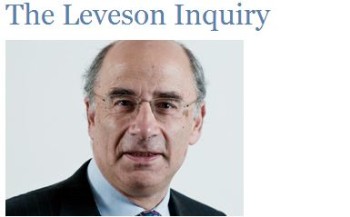
(Credit: Leveson Inquiry, screenshot)
A year after the first witness spoke at the Leveson Inquiry into press standards and practices, Lord Justice Brian Leveson released his findings in a 1,987-page, Nov. 29 published report. (See all the parts of the report. and Leveson’s statement on the report)
Leveson’s Executive Summary alone is a 46-page report that calls out the press for “too many” violations of multiple journalism standards, with victims from celebrities to the average private person. Previous dismissals of phone hacking and excuses that these violations were limited, specifically, the “one rogue reporter” defense at News of the World, were slammed. Leveson’s summary also made a series of recommendations directed at press regulation, the Ministry of Justice, the police and more. “The ball is now in the court of the politicians,” Leveson concluded.
The summary notes that the Leveson Report is the “seventh time in less than 70 years, a report has been commissioned by the Government which has dealt with concerns about the press.” In terms of the depth of the inquiry, Leveson, who called the inquiry “the most public and the most concentrated look at the press” in the UK, explained:
“It took three months to start receiving the evidence (although the process continued for a year). In nearly nine months of oral hearings, 337 witnesses gave evidence in person and the statements of nearly 300 others (individuals or groups) were read into the evidence without them being called. Almost all of the evidence is and has been available to watch and daily transcripts have also been published online. Statements and exhibits can be examined on the Inquiry website.”
Leveson wrote that the UK Prime Minister David Cameron, who ordered the inquiry after it was revealed by the Guardian that News of the World hacked the phone of Milly Dowler, a teenager who was murdered, called for him to “make recommendations, based firmly on the evidence” about changes to the press. Based on that evidence, Leveson noted that “there have been far too many occasions over the last decade and more” when the press has “ignored” its “responsibilities.” He wrote:
“There have been too many times when, chasing the story, parts of the press have acted as if its own code, which it wrote, simply did not exist. This has caused real hardship and, on occasion, wreaked havoc with the lives of innocent people whose rights and liberties have been disdained. This is not just the famous but ordinary members of the public, caught up in events (many of them, truly tragic) far larger than they could cope with but made much, much worse by press behaviour that, at times, can only be described as outrageous.”
Later on, Leveson added:
“Of course, most stories do not generate issues around libel, privacy or the rights of others and most of those that do have been written with high (if not very high) standards of integrity and propriety. But the significant number of stories that fail to meet those standards cannot be ignored and I have no doubt that they do reflect a culture (or, perhaps more accurately, a sub-culture) within some parts of some titles. What follows is not intended to be exhaustive.”
Leveson added that celebrities and their families also have been wronged by the press and “too often” the press failed to have any “genuine public interest” in invading privacy and publishing reports in which “important personal moments are destroyed.” Leveson listed undercover reporting, “blagging and deception,” as well as harassment, invasion of privacy, following sources, phone hacking, and a “failure of systems of management and compliance” as some of the issues with the UK press.
Other scathing criticism included the issues of accuracy and complaints. “When the story is just too big and the public appetite too great, there has been significant and reckless disregard for accuracy,” Leveson commented. Leveson also weighed in on media outlets avoiding corrections and complaints, writing:
“There is a cultural tendency within parts of the press vigorously to resist or dismiss complainants almost as a matter of course. Securing an apology, a correction or other appropriate redress, even when there can be no argument, becomes drawn out and difficult. When an apology or correction is forthcoming, there is then an argument as to prominence which, again, can be prolonged and reckless disregard for accuracy.”
But, Leveson noted,” The criticisms to be made of the culture practices and ethics of the press…are fully justified albeit only in relation to some titles for some of the time.”
Press Regulation
The UK phone scandal hasn’t just taken down newspapers, executives and journalists. The UK regulatory body, the Press Complaints Commission, has received a great deal of criticism for its lack of action as phone hacking allegations continued to surface. Last July, the same month News of the World was shut, Baroness Buscombe resigned as head of the PCC, as iMediaEthics wrote. In March of this year, the PCC announced that it was closing and “transferring its assets, liabilities and staf to a new regulatory body.”
According to Leveson, “not a single witness” nor he, recommends government interference with “regulation of the press.”
Leveson also slammed the PCC for its (now-withdrawn) 2009 report saying that despite the Guardian’s investigations into phone hacking, there wasn’t any “new evidence of phone hacking” at News of the World and criticized the PCC for having “lacked any credibility” and having “no serious investigation” into hacking claims.
Leveson didn’t spare words in his criticism of the PCC’s ability to handle the press, writing:
“The fundamental problem is that the PCC, despite having held itself out as a regulator, and thereby raising expectations, is not actually a regulator at all. In reality it is a complaints handling body. Scarcely any less profound are the numerous structural deficiencies which have hamstrung the organisation. It lacks independence. The Editors’ Code Committee which sets the rules is wholly made up of serving editors and is separate from the PCC. Its members are appointed by the Press Standards Board of Finance (‘PressBoF’), itself entirely made up of senior industry figures, which also controls the PCC’s finances and the appointment of the PCC Chair.”
He added the PCC has “less than universal coverage,” noting Northern & Shell’s quitting the PCC, and commented that the PCC’s “powers are inadequate, especially regarding the right to conduct an effective investigation.” Leveson wrote:
“In any event such powers as the PCC has appear to have been under-utilised. Further, even when complaints are upheld, the remedies at its disposal are woefully inadequate and enforceable only by persuasion.”
Leveson added that the PCC is too close to the press and “when it did investigate major issues it sought to head off or minimise criticism of the press.”
However, Leveson wrote that he “cannot recommend” Lord Black’s suggestion for press regulation for many “real and significant issues” including lack of independece and potential lack of “effectiveness of the enforcement mechanisms.”
For his part, Leveson suggested UK press regulation feature an “independent regulatory body…with the dual roles of promoting high standards of journalism and protecting the rights of individuals” that also “should set standards, both through a code and in relation to governance and compliance.” His proposal would have the body handling complaints, looking into “serious or systemic breaches” and having a “fair, quick and inexpensive arbitration service.” And, he wants that “new independent, self-regulatory body” to have a “whistle-blowing hotline.” Leveson emphasized that this body “must be independent” and its leaders should be named through “an independent appointments panel” and a “fair and open process.”
He also recommended “journalists’ contracts include a conscience clause,” something the UK National Union of Journalists has advocated for often, as iMediaEthics has written. iMediaEthics asked the National Union of Journalists for comment on Leveson’s report and recommendations concerning the clause, which would “allow [journalists] to decline to undertake work they consider in breach of the union’s Code of Conduct.” NUJ senior campaigns and communications officer Sarah Kavanagh directed iMediaEthics to the NUJ press release about the report and said a “more detailed response will be publish tomorrow.” That press release, “NUJ hails conscience clause for journalists,” notes that the NUJ “is pleased” with and “welcomes” Leveson’s backing, and quotes its general secretary, Michelle Stanistreet, as saying in part:
“From the outset of the Leveson inquiry, we demanded a conscience clause to safeguard journalists who object to being made to act unethically in the pursuit of a story.
“The NUJ has been campaigning for years for a conscience clause in contracts of employment and we are delighted that Lord Justice Leveson has listened to the voice of journalists.
“The NUJ will now do all it can to ensure that when journalists stand up for a principle of journalistic ethics they have a contractual protection against being dismissed.”
The Press Complaints Commission’s Lord Hunt, who replaced Baroness Buscombe as PCC chairman in October 2011, issued a statement Nov. 29 after the Leveson Report’s publication. Hunt said:
“Sir Brian Leveson is to be congratulated on a massive piece of work. Although I do not agree with all of the conclusions, I must praise him and his dedication and commitment.
“We all agree that we must regain the trust and confidence of the British people to make sure that unacceptable, outrageous and illegal behaviour can never be allowed to happen again.
“So we now need to find a way forward. I suggest that we all now digest this report and seek our common ground and then unite around it. Above all it is absolutely key that the result is a new regulator with effective sanctions and teeth, and independent from the Industry and from the Government.
“I have to say, however, that I am not convinced statutory regulation including supervision of press regulation by Ofcom would have prevented the horrors of the past. What will prevent them happening again is getting the press to sign up to a fresh start and a serious improvement in Governance and culture.”
iMediaEthics wrote to the PCC asking if, outside of Lord Hunt’s statement, the PCC had any other response to the report’s criticism. The PCC’s Catherine Speller referred us to Lord Hunt’s speech tonight, a copy of which has already been released. That speech, “Regulating the Media,” reads in part:
“Trust has to be earned. Journalism is a precious art and has its own powerful, specific traditions. Regulation has to be based upon principles rather than prescriptions. A good Editors’ Code of Practice already exists and demonstrates to the public at large the standards to which journalists should adhere. There have been demands for a clearer definition of public interest criteria.”
Phone Hacking & ‘Recklessness in Prioritising Sensational Stories’
Leveson commented that several years ago with the convictions of News of the World’s Clive Goodman and Glenn Mulcaire, News of the World’s “cooperation, if provided, was minimal” with police and he called out News International for failing to “undertake the type of investigative journalism (this time, into phone hacking)” and for the “one rogue reporter” excuse.
Further, Leveson commented on “recklessness,” sensationalism, invasion of privacy, and more in the press, writing:
“Phone hacking is most decidedly not all that is amiss with the way in which some parts of the press have operated some of the time.
“Based on all the evidence that I have heard, I have no doubt that, to a greater or lesser extent with a wider range of titles, there has been a recklessness in prioritising sensational stories, almost irrespective of the harm that the stories may cause and the rights of those who would be affected (perhaps in a way that can never be remedied), all the while heedless of the public interest. In the determination to get the story, this involved those (like the Dowlers, the McCanns and Abigail Witchell) thrust into the public eye through circumstances beyond their control; it involved those who were simply connected to someone famous (like HJK, who was permitted to give evidence anonymously, and Mary-Ellen Field who certainly suffered the consequences when it was thought that she had been leaking details relating to her principal).
“In each case, the impact has been real and, in some cases, devastating.”
Specifically calling out News of the World, Leveson commented on a “failure of systems,” and the high profile case of Max Mosley, the former F1 boss who successfully sued the newspaper for invasion of privacy after it published a 2008 story, “F1 boss has sick Nazi orgy with 5 hookers.” Leveson wrote:
“At the News of the World, quite apart from phone hacking, there was a failure of systems of management and compliance. None of the witnesses were able to identify who was responsible for ensuring compliance with an ethical approach to journalism and there was a general lack of respect for individual privacy and dignity. Few would subscribe to the view of Paul McMullan that ‘privacy is for paedos … privacy is evil’ but it is clear from the story concerning Max Mosley that the paper was not even prepared to review or reconsider its approach, which had gone so far as to involve possible blackmail, notwithstanding the trenchant views expressed by the High Court. It was said that the News of the World had “lost its way” in relation to phone hacking; its casual attitude to privacy and the lip service it paid to consent demonstrated a far more general loss of direction.”
“Neither is this charge to be levied only against the News of the World. Too many stories in too many newspapers were the subject of complaints from too many people, with too little in the way of titles taking responsibility, or considering the consequences for the individuals involved. Although code compliance is written into many journalists’ contracts, there seem to be few internal consequences for breach whether that breach was established as an inevitable conclusion following litigation or after criticism by the Press Complaints Commission. Too much has been written about the ‘dark arts’ to dismiss the concept as ‘rumour’ or ‘top-spin’ or the activities at a single rogue newspaper. There is insufficient clarity about what is acceptable and what is not: that is also what the PCC was, or at least should have been, championing.”
Press & Police, Politicians
The phone hacking scandal also raised questions about the closeness between the press and the police and/or politicians. The head of the UK police, Sir Paul Stephenson, resigned last year over the “ongoing speculation” about the police and News International being “too close.” Also, one of the UK police’s investigations into the improper press behavior, Operation Elveden, which looks into “allegations of unlawful payment by News International staff to public officials.”
Leveson touched on the relationship between the press and the police, including a possible tit-for-tat with police giving “tip offs” or “‘off-the-record’ briefings” to stories. He added:
“Taking the subject of ‘leaks’ generally, I must start by making it clear that although Operation Elveden (concerned with bribery of public officials) is proceeding, the Inquiry has not unearthed extensive evidence of police corruption nor is there evidence satisfying the standard of proof that I have adopted, namely the balance of probabilities, that significant numbers of police officers lack integrity in one or more of the respects I have examined. Speculation, suspicion and legitimate perceptions may abound and troubling evidence has been identified in a limited number of cases (with journalists tenaciously protecting their sources), but the notion, as a matter of established fact, that this may be a widespread problem is not borne out. The scale of the problem needs to be kept in proportion.”
Later, Leveson commented that “the issue is about perception, more than integrity” because, he wrote: “Most of the senior officers in the MPS who gave evidence receive, or have received, entirely appropriate forms of hospitality and entertainment from journalists in the context of the right sort of wider relationship.” Further, he characterized the UK police as cooperating with the inquiry “positively and proactively.”
Concerning politicians too close to the press, Leveson argued that “the evidence clearly demonstrates that, over the last 30-35 years and probably much longer, the political parties of UK national Government and of UK official Opposition, have had or developed too close a relationship with the press in a way which has not been in the public interest.”
Leveson also addressed the BSkyB bid, noting he didn’t find any “credible evidence of actual bias on the part of” Parliament Member Jeremy Hunt, but a “perception of bias” because of his Special Adviser, Adam Smith’s “informally” communicating with “News Corp’s professional lobbyist, Frédéric Michel.” As iMediaEthics has written, News International was trying to buy control of British Sky Broadcasting, but dropped its “$12 billion bid” in July 2011 as phone hacking claims piled up.
“The history of decision-taking on matters of media policy, including the history of the BSkyB bid, illustrates a significant issue which seems to me to lie at the heart of the problematic dimension to the relationship between the press and the politicians,” Leveson wrote.
Leveson also called for “political leaders..on behalf of their party” to release to the public the “party policy in conducting relationships with the press” is, for politicians to give the public an idea of “the frequency or density of other communications” like emails that politicians have with the press. He added:
“The best solution to the problem of bias or perception of bias is transparency.”
News International Response
A News International spokesperson sent iMediaEthics the following statement in response to the report:
“Statement from Tom Mockridge, Chief Executive Officer, News International
“We are grateful to Lord Justice Leveson for his thorough and comprehensive report, and will be studying its recommendations and comments in detail. As a company we are keen to play our full part, with others in our industry, in creating a new body that commands the confidence of the public. We believe that this can be achieved without statutory regulation – and welcome the Prime Minister’s rejection of that proposal. We accept that a new system should be independent, have a standards code, a means of resolving disputes, the power to demand prominent apologies and the ability to levy heavy fines. We have spent 18 months reflecting upon these issues and are determined to move on as soon as possible with others in our sector to set up a new body that will ensure British journalism is both responsible and robust.”
iMediaEthics has written to the Leveson Inquiry asking what’s next for the inquiry and will update with any responses.
See all of iMediaEthics’ reports about the Leveson Inquiry and the Phone Hacking Scandal.
UPDATE: 12/6/2012 9:31 AM EST: The Leveson Inquiry told iMediaEthics by email:
“The terms of reference for the Leveson Inquiry are available on the Inquiry website (www.levesoninquiry.org.uk). Lord Justice Leveson has now completed Part 1 of the Inquiry; as the Prime Minister made clear in his remarks last week, Part 2 cannot start until after the conclusion of the current police investigations and any criminal proceedings, and so no date has yet been fixed. In the meantime, Lord Justice Leveson returns to sit as a judge in the Court of Appeal here in England and Wales. “





Comments Terms and Conditions